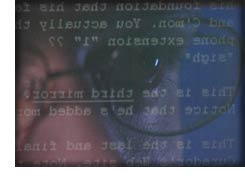


 Hackers leave no fingerprints. They spend days casing potential
victims--planting bugs that eventually allow them access to homes and
businesses around the globe. Their crimes range from vandalism to credit card
fraud to identity theft to multimillion-dollar bank heists.
Hackers leave no fingerprints. They spend days casing potential
victims--planting bugs that eventually allow them access to homes and
businesses around the globe. Their crimes range from vandalism to credit card
fraud to identity theft to multimillion-dollar bank heists.
These self-described techno-nerds devote their time and energies to
demonstrating just how vulnerable the internet has made once-secure
information. But are hackers merely the mischievous high-tech pranksters they
purport to be, or serious criminals costing businesses billions each year? And
can nations and corporations safeguard sensitive information from professional
hackers with potentially deadly aims?
FRONTLINE's "Hackers" explores these questions through interviews with
top computer security experts, government officials, and hackers themselves.
The one-hour report journeys into the hackers' world--from a Las Vegas hackers
conference to hackers' homes where their attacks were launched. It also visits
with those on their trail--from security experts tracking individual teen
hackers to information warfare experts playing virtual war games to prepare for
future cyber terrorists.
"I think the film is really a warning: In our rush to place everything on the
web, we've neglected security," says FRONTLINE producer Neil Docherty. "We now
find ourselves dangling from the internet, with personal details, confidential
corporate data, and government secrets accessible by fifteen-year-olds."
FRONTLINE's inquiry begins by demonstrating that the threats posed by hackers
are not targeted solely at corporations such as Microsoft; much of today's
hacking involves ordinary home computers. FRONTLINE meets with victims of
home computer invasion--including a victim of identity theft using the woman's
computer to get personal information.
And FRONTLINE speaks with numerous hackers who are only too willing to
share the customized software they've created to snoop unseen around the web.
They describe the adrenaline rush after cracking an ostensibly secure computer
or site.
"It's power at your fingertips," says a teen who hacked his way into the
NASA computer network. "You can control all these computers from the
government, military, large corporation if you know what you're doing..."
FRONTLINE also interviews hackers who claim they're watchdogs,
not menaces.
They say their true aim is to alert computer companies--and consumers--to
security breaches. FRONTLINE talks with members of one such group of
hackers--the "Cult of the Dead Cow" They created a software
program--Back Orifice--avalable free on the web--which enables users to commit
a computer invasion on almost any home computer. Cult members say they created
Back Orifice to point out a flaw in Microsoft's operating systems.
Not everyone, however, believes hackers should be congratulated for hacking
into private systems. Marty Stansell-Gamm, head of the U.S. Department
of Justice's Computer Crime Section, isn't buying hackers' claims of
altruistic motives. "It seems to me that thanking hackers...for pointing out
to us our [security] vulnerabilities is a little bit like sending thank-you
notes to burglars for pointing out the infirmity of our alarms."
Critics point to billions in damage from hacker "pranks" such as the "I Love
You" bug and the "Melissa" virus.. And FRONTLINE's report looks at the case of
Vladimir Levin. He became famous in hacker circles for stealing $10 million
from global Citibank accounts without leaving his apartment in St. Petersburg,
Russia.
But more sobering than white-collar crime is the threat of attacks on national
defense systems. FRONTLINE speaks with government officials who confirm that
several cyber assaults--two of which attacked the U.S. Army's computer
networks--have posed serious threats to national security.
Michael Vatis, director of the FBI's National Infrastructure Protection
Center, tells FRONTLINE: "My greatest fear is that the level of vulnerability
is still so high that we are really open to a devastating attack on a broad
scale against computer networks that run vital systems."
And Richard Power of the Computer Security Institute points out the danger in
dismissing hackers as just mischievous pranksters. "Juvenile hackers end up in
the headlines because they get caught," he says. "The professionals-- ex-KGB
agents, or ex-CIA agents, the person from German intelligence or Israeli
intelligence--they're not going to get caught."
So why aren't software manufacturers working to improve security? In most
cases, it seems, they are. "When vulnerabilities are found...we don't cover
them up," says Steven B. Lipner, a senior security analyst for Microsoft. "We
don't try to deny them. We acknowledge and fix them as fast as we can."
But even as software manufacturers scramble to produce "patches" to fix their
products' security leaks, their efforts are often hindered by a society that
prizes user-friendly features above security. "Usability, flexibility,
security are a set of trade-offs," says Lipner. "Customers don't want systems
so secure they can't use them."
Finally, this "Hackers" report examines the question of accountability.
With growing awareness of the internet's insecurities, who's
responsible for maintaining security--those who make the hardware and
software that drives the internet? Or the individuals, businesses and
governments that willingly connect their most sensitive information to it?

home · who are hackers? · risks of the internet · who's responsible · how to be vigilant · interviews
discussion · video excerpts · synopsis · press · tapes · credits
FRONTLINE · wgbh · pbs online
some photos copyright ©2001 photodisc
web site copyright WGBH educational foundation |